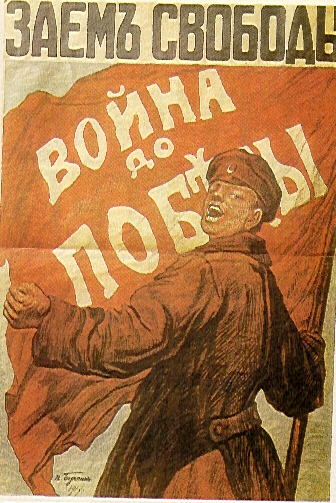|


The Russian Civil War of 1918-1920
The Russian civil war ravaged Russia from 1918 to up until 1920. The war was between the Bolsheviks (Reds) and the anti-Bolsheviks (Whites). The Whites represented all factions of the anti-Bolshevik movement.
The War first began in the southern part of Russia. The fighters (for the whites) in the south were mostly volenteers, who serverd under general Kornnilov, later they joined forces with the Cossacks.
Once World War I came to a close the fighting spread to the Ukraine, but it was seized by the Bolsheviks by early 1919. But this area was later taken by the Polish, out of the Russo-Polish war over this area.
Later that year, the Soviets reclaimed the area of Kazan from the White Army.
In the East, the White Army was fatally crushed. The Red Army Led and organized by Trotsky, was able to reclaim most of its lost territory. By 1920 all or Russia with exception of Siberia and Parts of Valdivostok were under Soviet Control.
|
 |
Allied Intervention
It is believed, but not proven that several western powers including the United States and Great Britain were involved in the Russian Civil War. According to Czech sources the western powers provided financial aid and Military aid, this included weapons and troops. (This was provide to the White army, at the time this information was never disclosed to the American public, it was just considered part of World War I) They remained until the summer of 1918.The Troops were located in northern Russian ports and areas in the far eastern portion of Russia such as Vladikistok. According to sources the Western Powers were there to overt through the Bolshevik regime.
This intervention created a slight distrust between the western powers and the Soviet Union.
|
|
Reasons for Red Victory
The White Army had little central organization, unlike the Reds, and personal rivalries were frequent among the leaders of the White Army. The Whites denounced Bolshevism, but affirmed nothing.
The Red Army was better organized, better disciplined, had numerical superiority, and had support from the industrial workers in Russia.
|
|
|